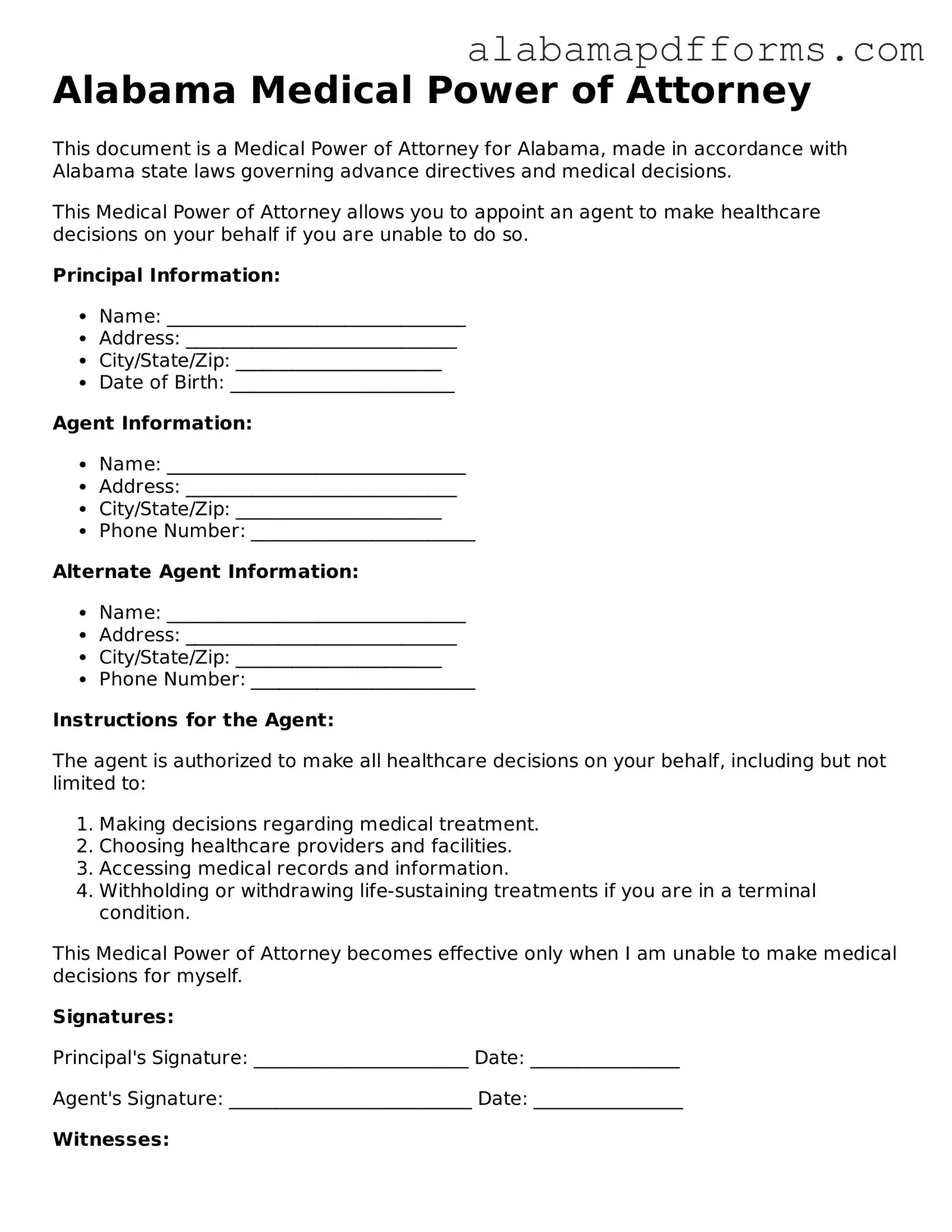The Alabama Medical Power of Attorney form is similar to the General Power of Attorney. While the Medical Power of Attorney specifically grants authority to make healthcare decisions on behalf of someone, the General Power of Attorney provides broader powers. This includes managing financial affairs, real estate transactions, and other legal matters. Both documents empower a designated individual, known as an agent or attorney-in-fact, to act in the best interest of the principal, but they differ in the scope of authority granted.
Another document that shares similarities is the Advance Healthcare Directive. This document allows individuals to outline their healthcare preferences in advance, including end-of-life decisions and specific medical treatments they wish to receive or avoid. Like the Medical Power of Attorney, it designates someone to make decisions if the individual becomes unable to do so. However, the Advance Healthcare Directive focuses more on the individual's wishes rather than appointing someone to make decisions on their behalf.
The Living Will is closely related to the Medical Power of Attorney as well. A Living Will explicitly states an individual's preferences regarding medical treatment in situations where they cannot communicate their wishes, particularly concerning life-sustaining measures. While the Medical Power of Attorney appoints an agent to make decisions, the Living Will serves as a guide for that agent, providing clarity on the individual's desires in critical situations.
The Healthcare Proxy is another document that functions similarly to the Medical Power of Attorney. It allows individuals to appoint someone to make healthcare decisions if they become incapacitated. The key difference lies in the terminology and potential state-specific requirements. In some states, the term "healthcare proxy" is used interchangeably with "medical power of attorney," but both serve the essential purpose of designating an agent for medical decision-making.
For those involved in vehicle transactions, understanding the legal requirements is vital. A useful resource is our guide to the required Motor Vehicle Bill of Sale for Alabama residents, which outlines the necessary steps and provides a framework for the bill of sale process.
The Do Not Resuscitate (DNR) order is also relevant in this context. While it does not appoint an agent, it serves as a directive regarding medical treatment preferences in emergencies, particularly concerning resuscitation efforts. Individuals can communicate their wishes about resuscitation through a DNR, which complements the Medical Power of Attorney by ensuring that their preferences are known and respected in critical situations.
The Mental Health Power of Attorney is another related document. This form specifically allows an individual to designate someone to make decisions regarding mental health treatment if they become unable to do so. Similar to the Medical Power of Attorney, it focuses on the well-being of the individual, ensuring that their mental health needs are addressed by someone they trust.
The Durable Power of Attorney is another document that bears similarities to the Medical Power of Attorney. This form grants authority to an agent to make decisions on behalf of the principal, but it encompasses both financial and healthcare matters. The key distinction is that the Durable Power of Attorney remains effective even if the principal becomes incapacitated, while the Medical Power of Attorney is specifically focused on healthcare decisions.
Lastly, the Authorization for Release of Medical Information is akin to the Medical Power of Attorney in that it deals with healthcare matters. This document allows individuals to grant permission for healthcare providers to share their medical information with designated individuals. While it does not empower someone to make decisions, it ensures that the appointed agent or family members have access to necessary medical information, which is crucial for informed decision-making.

